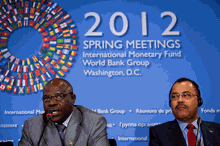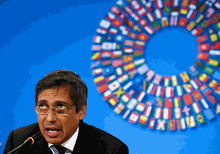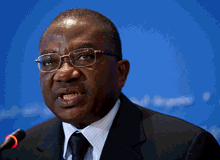
Typical street scene in Santa Ana, El Salvador. (Photo: iStock)
IMF Survey: Better Business Climate Can Soften Crisis Impact on Africa
April 22, 2012
- Africa can counter falling foreign investment by improving business climate
- More efficient domestic farm production can replace imported foodstuffs
- Africa can cut crisis effects by maximizing trade flows within the continent
African countries are focusing on improving their business climates to soften the impact on their economies of the crisis in the euro zone.

Sidewalk in Nairobi, Kenya: African economies are diversifying, reforming tax structures to become more business friendly (photo: Simon Maina/AFP)
AFRICAN FINANCE MINISTERS
African finance ministers told reporters at the 2012 IMF-World Bank Spring Meetings that faster domestic policy reforms that encouraged foreign investment would help maintain sustainable and inclusive growth on the continent.
The ministers, noting that rising global commodity prices were making Africa’s food and energy imports significantly more expensive, called for more efficient domestic farm production to replace imported foodstuffs. They added that enhanced regional integration and intraregional trade could help accelerate import substitution.
Finance Minister Manuel Chang told a April 21 news conference in Washington D.C. that Mozambique had seen lower foreign trade volumes, declining export prices, a drop in foreign investment, reduced aid flows, and falling remittances as a result of the global economic crisis.
“We are addressing falling foreign investment by improving the business climate through fiscal reforms,” Chang said. To counter the effect of falling remittances, the government sought to create jobs by stimulating the startup of small businesses.

Burundi’s Manirakiza (l), Mozambique’s Chang: regional integration and intraregional trade could help accelerate import substitution (IMF photo)
Finance Minister Xavier-Luc Duval said Mauritius was highly dependent on the European market, sending 65 percent of its exports of sugar and textiles to European consumers, who were reducing their demand for such products. Tourism and foreign investment in Mauritius were also expected to be subdued this year.
Business-friendly conditions
The government had, however, diversified the economy and reformed the tax structure to make conditions more business friendly, Duval said. “Our reforms have resulted in Mauritius being the first African country to make the top 10 in the Heritage Foundation-Wall Street Journal Index of Economic Freedom,” Duval noted.

Mauritius’ Duval: great potential benefits lie in speeding regional integration in Africa; nontrade barriers should be brought down quickly (IMF photo)
Finance Minister Tabu Abdallah Manirakiza said Burundi was feeling the impact of the global financial crisis on its growth and its budget, but was pressing ahead with a second-generation poverty reduction strategy to ease economic conditions. He said an area of focus for the authorities was development of the tourism industry, and he noted that Burundi was rising in the rankings of the World Bank’s Doing Business report.
International confidence
Finance Minister Lucien Marie Noel Bembamba said Burkina Faso was promoting growth by introducing a new Strategy for Accelerated Growth and Lasting Development. A successful recent donors conference was a sign of international confidence in the government’s policies, he stated.

Burkina Faso’s Bembamba: reforms include strengthening economic governance, promoting efficient management of government spending (IMF photo)
Bembamba noted that Burkina Faso’s membership in the West African Economic and Monetary Union represented a link to the euro area. “We need lasting growth to boost employment,” Bembamba said. “We will continue to implement reforms because only with reforms will we progress from our current situation.”
Reforms being enacted included measures to strengthen economic governance and promote the efficient management of government spending, he added. “We need to reduce operating costs to free up resources.”
Investment promotion
Duval said great potential benefits lay in speeding regional integration in Africa. Nontrade barriers should be brought down more quickly, in the form of double taxation agreements and investment promotion pacts between countries. Bembamba said greater intraregional trade offered Africa protection from global crises by maximizing trade flows within the continent.
Chang said great efforts were being made to encourage African countries to trade more with each other. He noted that the Southern African Development Community, of which Mozambique is a member, is one of several regional economic groupings that promote intraregional trade.


